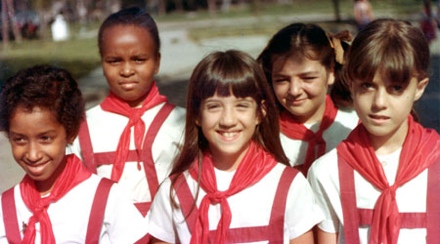Tribeca Movie Review: The Sugar Curtain
The following movie was seen at the 2007 Tribeca Film Festival:

The Sugar Curtain (El Telón de Azúcar)
World Documentary Competition
2006, Cuba, France, Spain
Dir: Camila Guzmán Urzúa
A daring look at the remnants of a failed dream, The Sugar Curtain takes a personal route and looks at director Camila Guzmán Urzúa's experience as a child during the "Golden Age" of Cuban Communism. The dream was that of forming a perfectly functioning community under the tenants of a Communism molded to fit the people of Cuba. When it crumbled, so did the aspirations of a generation brought up to believe they were the future builders of their society.
Urzúa and her family were political exiles from Chile during the military coup that led to the rise of General Agusto Pinochet and the death of former socialist president Salvador Allende in 1973. Cuba opened its arms to all Latin American exiles, and the Urzúa family established themselves there, staying for fifteen years. The Cuban education system at that time had instituted the Pioneer System. All students were labeled Pioneers and were indoctrinated with Cuban and Soviet history, and Communist teachings. The children, apart from having a rigorous load of schoolwork, were also taught to cook, sow, make ceramics and learn other such trades that were deemed useful and necessary for the development of every citizen. The Communist citizen was to be upright and knowledgeable in multiple disciplines in order to be more fully prepared to lead the country. These children were being trained to become the next breed of doctors, lawyers, teachers, and public office holders.
Urzúa identifies the innocence of the time, displaying a nostalgic return to what was once the Cuba of her childhood, yet understanding that once the curtain was lifted and the smoke vanished, nothing would ever be the same. And nothing has been since. When the Berlin wall collapsed in 1987, so did the U.S.S.R. and all economic support to Cuba. At that point in time the "Special Period" began and the rationing of food and services, such as electricity, commenced. Overnight, Cuba was transformed from a country of lush prospects and unbridled hope, into a land of devastation and utter poverty.
Interviews with former classmates help the film find its voice, as those former Pioneers realize that their aspirations of reaching the Communist-infused goal of success and opportunity were severely dashed. But they are a strong people who show hope, smiles, and laughter in the face of adversity. They take their situation with a bit of humor to help them get through it, as they recount their bittersweet stories of loving their country, despite the state it's in. Even though they are stuck in the grips of abandonment, they have not lost their faith in their country. The hope that was lost when the initial dream planted by Castro and his men vanished, has somehow surfaced and transformed into the force that keeps the Cuban people going. A fantastic film.
/Film Rating: 9 out of 10